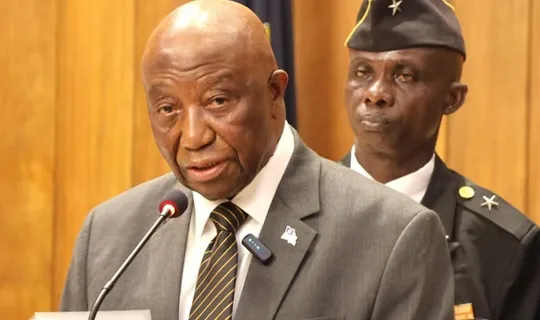
In the wake of mounting criticism over President Joseph N. Boakai’s decision to appoint Vice President Jeremiah Koung to lead a committee on Liberia’s economic challenges, supporters of the move have sought to clarify its legitimacy and necessity.
Detractors had accused the President of sidelining the Economic Management Team (EMT), a body composed of technocrats. However, advocates point out that the President himself chairs the EMT, with the Vice President serving as its vice chairman.
As such, they argue the appointment does not bypass the EMT’s authority but rather reinforces the government’s leadership in tackling economic issues.
“The EMT is primarily advisory, and its authority is ultimately superseded by that of the President,” noted Molley Kamara, a contributing political analyst, in defence of the move.
He added that both the President and Vice President bring technical expertise to the table, making Koung’s appointment appropriate and strategic.
In Liberia’s executive system, only the President and Vice President are elected representatives. Supporters say it is therefore natural for the Vice President to play a central political and administrative role in advancing the government’s agenda.
President Boakai, who has called for the resignation of politicians prioritising personal ambition over governance, is seen by his allies as relying on Koung to drive his economic vision forward.
They also argue that the economic difficulties confronting Liberia—just 18 months into the current administration—justify the formation of such a committee.
“If the economy was progressing according to plan, there would be no need for this appointment,” Kamara observed, stressing that the measure acknowledges pressing challenges while signalling the government’s readiness to act.
Citing Liberia’s experience under the Heavily Indebted Poor Countries (HIPC) programme, Kamara dismissed claims by former ministers that they alone secured the country’s debt relief, noting it was a product of global policy frameworks and Liberia’s post-war circumstances.
Vice President Koung’s track record, supporters insist, speaks for itself. Having won three successive elections in Nimba County, contributed significantly to the ruling coalition’s 2023 victory, and established businesses creating hundreds of jobs, they see him as both a political and economic asset.
However, Kamara warned against unchecked political ambition within the government, urging President Boakai to address what he described as “inordinate ambition” and early succession politics ahead of the 2029 elections. He cautioned that such distractions could undermine the administration’s vision and stall progress on urgent national priorities.



